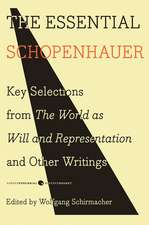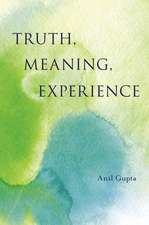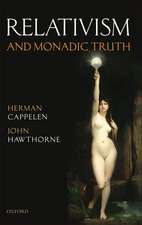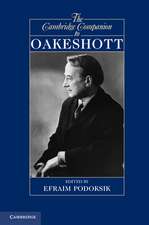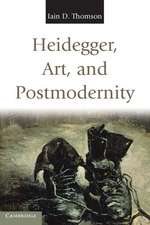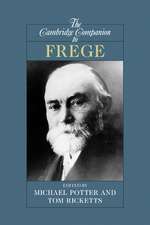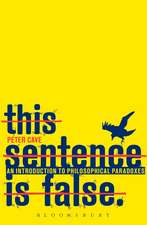Heidegger in America
Autor Martin Woessneren Limba Engleză Hardback – 19 dec 2010
| Toate formatele și edițiile | Preț | Express |
|---|---|---|
| Paperback (1) | 288.04 lei 6-8 săpt. | |
| Cambridge University Press – 16 dec 2020 | 288.04 lei 6-8 săpt. | |
| Hardback (1) | 694.91 lei 6-8 săpt. | |
| Cambridge University Press – 19 dec 2010 | 694.91 lei 6-8 săpt. |
Preț: 694.91 lei
Preț vechi: 780.80 lei
-11% Nou
Puncte Express: 1042
Preț estimativ în valută:
132.98€ • 142.19$ • 110.87£
132.98€ • 142.19$ • 110.87£
Carte tipărită la comandă
Livrare economică 18 aprilie-02 mai
Preluare comenzi: 021 569.72.76
Specificații
ISBN-13: 9780521518376
ISBN-10: 0521518377
Pagini: 308
Dimensiuni: 160 x 235 x 26 mm
Greutate: 0.54 kg
Editura: Cambridge University Press
Colecția Cambridge University Press
Locul publicării:New York, United States
ISBN-10: 0521518377
Pagini: 308
Dimensiuni: 160 x 235 x 26 mm
Greutate: 0.54 kg
Editura: Cambridge University Press
Colecția Cambridge University Press
Locul publicării:New York, United States
Cuprins
Introduction - being here: Heidegger and reception history; Preface; 1. Freiburg bound: the early years of American Heidegger scholarship; 2. Exiles and emissaries: Heidegger's stepchildren in the United States; 3. Nihilism, nothingness, and God: Heidegger and American theology; 4. An officer and a philosopher: J. Glenn Gray and the postwar introduction of Heidegger into American thought; 5. Dasein and das Man: Heidegger and American popular culture; 6. The continental divide: Heidegger between the analytic and continental traditions in American philosophy; 7. Richard Rorty and the riddle of the book that never was; 8. Ethics, technology, and memory: Heidegger and American architecture; 9. Culture wars: Heidegger and the politics of postmodernism; Conclusion - being there: Heidegger and the history of ideas.
Recenzii
'Admire him or loathe him, Martin Heidegger remains one of the inescapable presences of modern intellectual history. But it has been hard to take an adequate measure of his ideas, particularly as they were received in the United States, given the many academic disciplines and fields of expression in which his influence has been felt and the diffuse forms and diverse intermediaries through which his insights passed. It is the great contribution of Martin Woessner's lively and engaging study to begin tracking down those lines of force, a task he accomplishes with intelligence and verve, bringing a critical eye, a broadly cultural sensibility, a crisp prose style, and a wry wit to bear on a subject that too often becomes mired in its own vatic solemnities. Readers in a wide variety of disciplines will derive both pleasure and instruction from this exemplary work of intellectual history.' Wilfred M. McClay, University of Tennessee, Chattanooga
'By showing who has made use of Martin Heidegger in the United States, Martin Woessner's book provides a striking and informative contribution to American and trans-Atlantic intellectual history. It is also a pathbreaking study of philosophical reception: an exemplary performance at a time when more and more historians are interested in how ideas travel. From a gallery of religious enthusiasts to the singular character of J. Glenn Gray, Woessner covers a host of forgotten figures. He gives philosophical readers from brilliant German exiles to Hubert Dreyfus and his followers their due. And he scrutinizes many genres, from the treatise Richard Rorty never wrote to architecture and film. Along the way, Woessner restores the freedom of selective interpretation, the insight of constructive appropriation, and the scandal of provincial misunderstanding to the story of how even the highest thought circulates.' Samuel Moyn, Columbia University
'There are very few modern Continental philosophers whom Woessner could have chosen for a study of their influence and reception in America. Among those, Heidegger is not only the most difficult but also the most profound … 'Getting it right' is said to be an American (pragmatist) virtue. If so, Heidegger in America is an exceptionally virtuous book.' Santiago Zabala, Common Knowledge
'… an important and captivating study in which life stories and the stories of ideas are presented in a balanced and fair manner. It presents not only the complex influence of a controversial philosopher but traces his central ideas and shows how, where, when and why they arose and how they have evolved in different contexts in American society.' Theodor Damian, The European Legacy
'By showing who has made use of Martin Heidegger in the United States, Martin Woessner's book provides a striking and informative contribution to American and trans-Atlantic intellectual history. It is also a pathbreaking study of philosophical reception: an exemplary performance at a time when more and more historians are interested in how ideas travel. From a gallery of religious enthusiasts to the singular character of J. Glenn Gray, Woessner covers a host of forgotten figures. He gives philosophical readers from brilliant German exiles to Hubert Dreyfus and his followers their due. And he scrutinizes many genres, from the treatise Richard Rorty never wrote to architecture and film. Along the way, Woessner restores the freedom of selective interpretation, the insight of constructive appropriation, and the scandal of provincial misunderstanding to the story of how even the highest thought circulates.' Samuel Moyn, Columbia University
'There are very few modern Continental philosophers whom Woessner could have chosen for a study of their influence and reception in America. Among those, Heidegger is not only the most difficult but also the most profound … 'Getting it right' is said to be an American (pragmatist) virtue. If so, Heidegger in America is an exceptionally virtuous book.' Santiago Zabala, Common Knowledge
'… an important and captivating study in which life stories and the stories of ideas are presented in a balanced and fair manner. It presents not only the complex influence of a controversial philosopher but traces his central ideas and shows how, where, when and why they arose and how they have evolved in different contexts in American society.' Theodor Damian, The European Legacy
Notă biografică
Descriere
Heidegger in America is an intellectual and cultural reception study of one of the twentieth century's most controversial philosophers.

